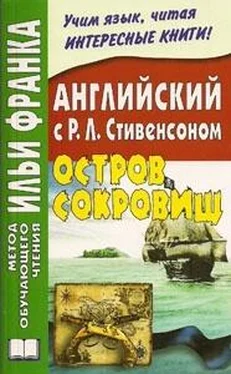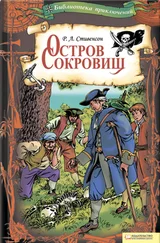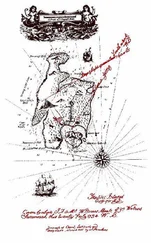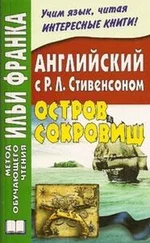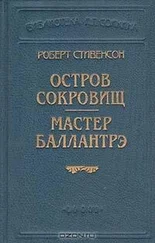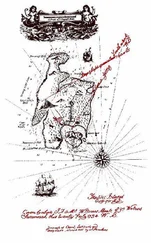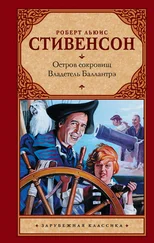thigh [TaI] darting [dRtIN] ultimate [`AltImeIt] puncheon [`pAntSqn] scupper [`skApq]
Seeing that I meant to dodge, he also paused; and a moment or two passed in feints on his part, and corresponding movements upon mine. It was such a game as I had often played at home about the rocks of Black Hill Cove; but never before, you may be sure, with such a wildly beating heart as now. Still, as I say, it was a boy’s game, and I thought I could hold my own at it, against an elderly seaman with a wounded thigh. Indeed, my courage had begun to rise so high, that I allowed myself a few darting thoughts on what would be the end of the affair; and while I saw certainly that I could spin it out for long, I saw no hope of any ultimate escape.
Well, while things stood thus, suddenly the Hispaniola struck, staggered, ground for an instant in the sand, and then, swift as a blow, canted over to the port side, till the deck stood at an angle of forty-five degrees, and about a puncheon of water splashed into the scupper holes, and lay, in a pool, between the deck and bulwark.
We were both of us capsized in a second(мы оба потеряли равновесие в мгновение; to capsize — опрокинуться, перевернуться ) , and both of us rolled, almost together, into the scuppers(и оба покатились, почти вместе = обнявшись, к шпигатам) ; the dead red-cap, with his arms still spread out, tumbling stiffly after us(мертвый «красный колпак», со все еще раскинутыми руками, катился одеревенело за нами; to tumble — валяться, метаться, кувыркаться; stiff — тугой, негибкий, неэластичный, жесткий; окостеневший, одеревенелый ) . So near were we, indeed, that my head came against the coxswain’s foot with a crack that made my teeth rattle(мы были так близко /друг от друга/, что моя голова ударилась о ногу рулевого с силой, которая заставила мои зубы лязгнуть; crack — треск, хруст, удар; to rattle — трещать, греметь, дребезжать ) . Blow and all, I was the first afoot again(/несмотря/ на удар и все остальное, я первым встал на наго снова) ; for Hands had got involved with the dead body(потому что Хендсу помешало мертвое тело/запутался в мертвом теле; involved with — запутанный, связанный ) . The sudden canting of the ship had made the deck no place for running on(внезапный крен корабля сделал палубу не местом для = сделал дальнейшую беготню невозможной) ; I had to find some new way of escape(мне пришлось искать другой способ спасения) , and that upon the instant, for my foe was almost touching me(и немедленно, так как мой враг почти касался меня; to touch — трогать, задевать, влиять ) . Quick as thought(с быстротою молнии: «быстрый, как мысль») , I sprang into the mizzen shrouds(я бросился к вантам бизань-/мачты/) , rattled up hand over hand(взобрался быстро; to rattle up — с грохотом или быстро поднимать; hand over hand — быстро, проворно ) , and did not draw a breath till I was seated on the cross-trees(и ни разу не передохнул, пока не уселся на салинге; to draw a breath — сделать /глубокий/ вдох, передохнуть; салинг — рама из брусьев, служащая для соединения стеньги с ее продолжением в высоту и крепления снастей ) .
I had been saved by being prompt(меня спасло мое проворство; prompt — быстрый, оперативный ) ; the dirk had struck not half a foot below me(кинжал ударил = блеснул меньше, чем в полуфуте подо мной) , as I pursued my upward flight(когда я поднимался быстро вверх; to pursue — следовать неотступно за, выполнять; flight — полет; бегство, поспешное отступление ) ; and there stood Israel Hands with his mouth open and his face upturned to mine(и там /внизу/ стоял Израэль Хендс с открытым ртом и глядел на меня: «с лицом, поднятым кверху на меня») , a perfect statue of surprise and disappointment(превосходная статуя = застыв, как памятник, от удивления и досады) .
Now that I had a moment to myself(теперь, когда у меня был миг = небольшая передышка /для себя/) , I lost no time in changing the priming of my pistol(я не терял времени, а сменил запал своего пистолета) , and then, having one ready for service, and to make assurance doubly sure(и затем, подготовив его и для большей верности: «чтобы вдвойне застраховаться»; ready for service — готовый для работы, годный к эксплуатации ) , I proceeded to draw the load of the other, and recharge it afresh from the beginning(я приступил к зарядке второго, и перезарядил его заново с самого начала) .
сapsized [kxp`saIzd] pursued [pq`sjHd] assurance [q`Suqrqns] recharge [rJ`tSRG]
We were both of us capsized in a second, and both of us rolled, almost together, into the scuppers; the dead red-cap, with his arms still spread out, tumbling stiffly after us. So near were we, indeed, that my head came against the coxswain’s foot with a crack that made my teeth rattle. Blow and all, I was the first afoot again; for Hands had got involved with the dead body. The sudden canting of the ship had made the deck no place for running on; I had to find some new way of escape, and that upon the instant, for my foe was almost touching me. Quick as thought, I sprang into the mizzen shrouds, rattled up hand over hand, and did not draw a breath till I was seated on the cross-trees.
I had been saved by being prompt; the dirk had struck not half a foot below me, as I pursued my upward flight; and there stood Israel Hands with his mouth open and his face upturned to mine, a perfect statue of surprise and disappointment.
Now that I had a moment to myself, I lost no time in changing the priming of my pistol, and then, having one ready for service, and to make assurance doubly sure, I proceeded to draw the load of the other, and recharge it afresh from the beginning.
My new employment struck Hands all of a heap(мое новое занятие ошеломило Хендса; to struck all of a heap — поразить, привести в замешательство, ошеломить; heap — груда, куча, масса; to strike — ударять(ся), наносить удар, бить ) ; he began to see the dice going against him(он начал понимать, что удача идет против него = отвернулась от него; dice — игральная кость; удача ) ; and after an obvious hesitation, he also hauled himself heavily into the shrouds(и после очевидного колебания он тоже ухватился за ванты; to haul — тянуть, волочить, тащиться, добираться с трудом; ванты — канатные растяжки между мачтами и бортом парусного судна, служащие для придания мачтам устойчивого вертикального положения ) , and, with the the dirk in his teeth, began slowly and painfully to mount(и с кинжалом в зубах, он начал медленно и мучительно взбираться /по мачте/) . It cost him no end of time and groans to haul his wounded leg behind him(это стоило ему массы времени и стонов, чтобы волочить за собой раненную ногу) ; and I had quietly finished my arrangements(и я спокойно закончил свои приготовления) before he was much more than a third of the way up(прежде чем он проделал больше, чем треть пути наверх = не намного больше, чем треть пути) . Then, with a pistol in either hand, I addressed him(затем, с пистолетом в каждой руке, я обратился к нему) .
Читать дальше
Конец ознакомительного отрывка
Купить книгу
